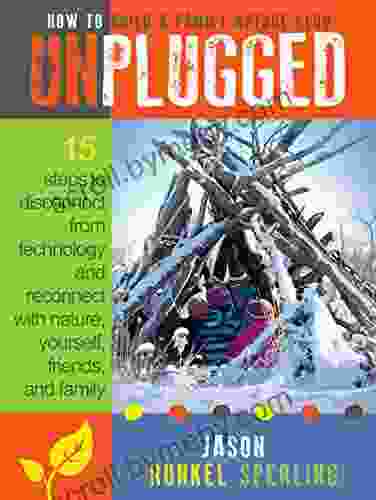15 Steps to Disconnect from Technology and Reconnect with Nature (Yourself)

In an era where technology permeates every aspect of our lives, it has become increasingly challenging to find moments of respite and connect with the natural world. The constant bombardment of notifications, social media updates, and digital distractions has left many feeling overwhelmed, stressed, and disconnected from their true selves.
4.7 out of 5
| Language | : | English |
| File size | : | 4439 KB |
| Text-to-Speech | : | Enabled |
| Screen Reader | : | Supported |
| Enhanced typesetting | : | Enabled |
| Word Wise | : | Enabled |
| Print length | : | 188 pages |
| Lending | : | Enabled |
Research has shown that excessive technology use can lead to various health issues, including anxiety, depression, sleep disturbances, and even physical ailments such as headaches and muscle tension. It can also impair our ability to focus, concentrate, and engage in meaningful relationships.
The good news is that it's possible to break free from the clutches of technology addiction and rediscover the transformative power of nature. By taking conscious steps to disconnect from technology and reconnect with the natural world, we can unlock a wealth of benefits for our physical, mental, and emotional well-being.
15 Steps to Disconnect from Technology and Reconnect with Nature
- Identify your triggers. What situations or emotions lead you to reach for your phone or other devices? Once you understand your triggers, you can start to develop strategies for managing them without resorting to technology.
- Set technology-free zones. Establish certain areas or times of the day where technology is not allowed, such as the bedroom or during family meals.
- Find activities that you enjoy. Make a list of activities that you enjoy and that help you feel relaxed and connected to nature, such as hiking, gardening, painting, or reading.
- Plan technology-free outings. Schedule regular outings where you leave all technology at home and immerse yourself in nature. Explore local parks, trails, or beaches.
- Connect with nature on a daily basis. Even if you can't get away for a longer period, make an effort to connect with nature in small ways every day. Take a walk in the park, sit under a tree, or tend to your houseplants.
- Practice mindfulness. Pay attention to the present moment and your surroundings without judgment. Notice the sights, sounds, smells, and textures of nature.
- Learn about nature. The more you know about nature, the more you will appreciate its beauty and complexity. Read books, watch documentaries, and attend nature walks or workshops.
- Spend time with animals. Animals can be incredibly calming and therapeutic. Spend time with pets, wildlife, or visit a local animal shelter.
- Create a nature journal. Document your experiences in nature, including observations, reflections, and drawings. This can help you deepen your connection and appreciation for the natural world.
- Practice gratitude. Express gratitude for the beauty and bounty of nature. Notice the small things, such as a beautiful flower or a sunrise. Gratitude can help shift your perspective and foster a greater sense of connection.
- Reduce your overall screen time. Set limits on how much time you spend on screens each day and stick to them.
- Use technology intentionally. When you do use technology, be mindful about how you use it. Set clear goals and limits to prevent mindless scrolling or overconsumption.
- Be patient. Disconnecting from technology and reconnecting with nature takes time and effort. Don't get discouraged if you slip up. Just keep practicing and you will eventually see the benefits.
- Find a support group or therapist. If you find it challenging to disconnect from technology on your own, consider joining a support group or seeking professional help.
- Remember the power of nature. Reconnecting with nature is not just about escaping technology. It's about reconnecting with a vital part of ourselves. Nature has the power to heal, inspire, and sustain us.
Benefits of Disconnecting from Technology and Reconnecting with Nature
- Reduced stress and anxiety. Spending time in nature has been shown to lower stress hormone levels and promote relaxation.
- Improved mood and well-being. Nature exposure has been linked to increased feelings of happiness, optimism, and self-esteem.
- Enhanced creativity and problem-solving skills. Nature can provide a quiet and inspiring space for reflection and idea generation.
- Improved physical health. Spending time in nature can boost the immune system, improve cardiovascular health, and reduce inflammation.
- Increased environmental awareness. Reconnecting with nature can foster a greater appreciation for the environment and inspire sustainable practices.
- Enhanced self-discovery and personal growth. Nature provides an opportunity for introspection and self-reflection, facilitating personal growth and self-discovery.
- Improved sleep. Exposure to natural light and the calming effects of nature can promote better sleep.
- Strengthened relationships. Spending time in nature with loved ones can foster closer bonds and create lasting memories.
In a world that is increasingly reliant on technology, it's more important than ever to find ways to disconnect and reconnect with nature. By following the steps outlined in this article, you can break free from the shackles of technology addiction and rediscover the transformative power of the natural world. In ng so, you will not only improve your physical and mental well-being but also foster a greater sense of connection, purpose, and fulfillment.
Remember, the path to a more balanced and fulfilling life begins with a simple step outside. Embrace the beauty and wisdom of nature, and let it guide you on a journey of self-discovery and renewal.
4.7 out of 5
| Language | : | English |
| File size | : | 4439 KB |
| Text-to-Speech | : | Enabled |
| Screen Reader | : | Supported |
| Enhanced typesetting | : | Enabled |
| Word Wise | : | Enabled |
| Print length | : | 188 pages |
| Lending | : | Enabled |
Do you want to contribute by writing guest posts on this blog?
Please contact us and send us a resume of previous articles that you have written.
 Book
Book Novel
Novel Page
Page Chapter
Chapter Text
Text Story
Story Genre
Genre Reader
Reader Library
Library Paperback
Paperback E-book
E-book Magazine
Magazine Newspaper
Newspaper Paragraph
Paragraph Sentence
Sentence Bookmark
Bookmark Shelf
Shelf Glossary
Glossary Bibliography
Bibliography Foreword
Foreword Preface
Preface Synopsis
Synopsis Annotation
Annotation Footnote
Footnote Manuscript
Manuscript Scroll
Scroll Codex
Codex Tome
Tome Bestseller
Bestseller Classics
Classics Library card
Library card Narrative
Narrative Biography
Biography Autobiography
Autobiography Memoir
Memoir Reference
Reference Encyclopedia
Encyclopedia Elizabeth Mcdavid Jones
Elizabeth Mcdavid Jones Dean Movshovitz
Dean Movshovitz Claudette Melanson
Claudette Melanson Rebecca Vincent
Rebecca Vincent Colin Odell
Colin Odell William D Cohan
William D Cohan Elijah Nicholas Wilson
Elijah Nicholas Wilson Courtney Kenney
Courtney Kenney Louise Davidson
Louise Davidson Conor Mcpherson
Conor Mcpherson Dale F Bloom
Dale F Bloom Sophie Messager
Sophie Messager Roy John
Roy John Craig Walls
Craig Walls Connie Berry
Connie Berry Cullen Roche
Cullen Roche Connor Lynndan
Connor Lynndan William C Rempel
William C Rempel Juman Kubba
Juman Kubba Jesse Watters
Jesse Watters
Light bulbAdvertise smarter! Our strategic ad space ensures maximum exposure. Reserve your spot today!

 Gene PowellThe Ultimate Self-Defense Guide for Men and Women: A Lifetime of Experience...
Gene PowellThe Ultimate Self-Defense Guide for Men and Women: A Lifetime of Experience... Cormac McCarthyFollow ·6.6k
Cormac McCarthyFollow ·6.6k Carlos DrummondFollow ·19.1k
Carlos DrummondFollow ·19.1k Dominic SimmonsFollow ·15.6k
Dominic SimmonsFollow ·15.6k Isaiah PriceFollow ·19.2k
Isaiah PriceFollow ·19.2k Theodore MitchellFollow ·6.1k
Theodore MitchellFollow ·6.1k Roger TurnerFollow ·3.8k
Roger TurnerFollow ·3.8k Griffin MitchellFollow ·17.3k
Griffin MitchellFollow ·17.3k Herbert CoxFollow ·17.4k
Herbert CoxFollow ·17.4k

 Cruz Simmons
Cruz SimmonsUnveiling the Secrets: An Insider Guide to School Bonds...
Unlock the Power of School...

 Gil Turner
Gil TurnerRuins of Empire: Blood on the Stars - The Epic Space...
Ruins of Empire: Blood on the Stars is the...

 Allen Ginsberg
Allen GinsbergPrepare for the Ultimate Space Opera: Delve into The Last...
Embark on an...

 Anton Foster
Anton FosterUnleash Your Inner Artist: The Ultimate Guide to Oil...
Chapter 1: The...
4.7 out of 5
| Language | : | English |
| File size | : | 4439 KB |
| Text-to-Speech | : | Enabled |
| Screen Reader | : | Supported |
| Enhanced typesetting | : | Enabled |
| Word Wise | : | Enabled |
| Print length | : | 188 pages |
| Lending | : | Enabled |














